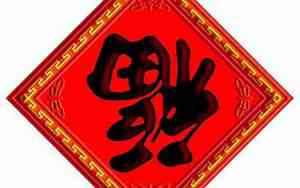
【深度解读】《福字倒贴:传统文化的艺术与智慧》
在中国的传统文化中,一张小小的福字不仅仅是汉字,更是一种吉祥的符号,蕴含着深远的寓意与习俗。每年春节期间,家家户户都会贴上倒置的“福”字,这个看似不经意的行为,实则蕴含着一个流传千年的智慧与吉祥的愿望。今天,让我们一起探析“福字倒贴”的背后故事,以及它所代表的成语寓意。
让我们回到那个古老的习俗。据史书记载,清朝时期,人们开始流行在春节期间将“福”字倒贴。这种倒置的福字,意在“福到了”(fú dào le),象征着“福气来临”的美好期望,寓意生活富饶,幸福安康。这个习俗尤为体现在对门联的对仗中,如“福门倒彩,好运连连”(fú mén dǎo cǎi,hǎo yù lián lián),尽显春节喜庆气氛。
要说与福字倒贴相关的成语,最常提及的是“福至心灵”(fú zhì xīn líng)。这个成语源自《汉书·董仲舒传》,意指福气到来时,人的心灵会变得清明,充满智慧。在贴倒“福”字的家中,人们希望福气不仅降临在物质上,更希望心灵得到滋养,生活智慧与福气并存。
另一个相关的成语是“倒持泰斗”,虽然原意是指地位颠倒,但在民间,这个成语常被理解为“福字倒贴”,象征着家庭的幸福与吉祥。倒置的福字就像是颠倒的泰斗,寓意家庭的尊贵和幸福,寓意着家和万事兴。
倒贴福字并非无条件的,还要符合中国的传统文化对“左”与“右”的尊重。在一般情况下,正确的贴法是让福字的“福”字头朝上,寓意着福气从天而降;而倒贴时,通常只在家庭内部或对联上,对外则保持正置,以示尊重。
总结来说,福字倒贴是中国春节文化中的一抹鲜艳色彩,它既是习俗的表达,也是传统文化智慧的体现。这个小小的倒贴动作,包含了深厚的民俗寓意和美好的生活愿景,提醒我们无论何时,都应珍惜和传承这份吉祥的文化遗产。
福字倒贴,这一独特的习俗在中国传统节日中扮演着吉祥的角色。在春节期间,家家户户常常将“福”字倒置张贴,这并非简单的笔误,而是饱含深意。倒置的“福”字代表了“福到了”(fú dào le),象征着幸福、好运和财富的降临,寓意着人们期待着美好生活的到来,希望家中富饶,生活安康。
在中国文化中,这种倒贴的“福”字并非随意为之。它巧妙地利用了汉字的特点,将“福”字的“倒”与“到”两个字关联起来,形成了一种独特的象征。此外,它也与汉字中的左、右之分有关,虽然在一般场合正贴更为常见,但在特定的节日和家庭内部,倒贴福字则象征着家庭内部的欢乐和亲情。
这样一种习俗,不仅体现了中国人民对幸福生活的渴望,还巧妙地融入了丰富的文化内涵。它提醒我们,无论是传统节日还是日常生活中,人们都在用这种独特的方式,传递着对美好未来的祝福和期望。因此,福字倒贴不仅仅是一种装饰,更是一种美好寓意的载体,是中国人对和谐、富裕生活的向往和庆祝。
The act of "fú zì dào tiē" (福字倒贴) in Chinese culture carries a significant meaning in English, translating to "upside-down福" or "reversed happiness." During the Chinese New Year, this practice symbolizes "good fortune arrived" (good fortune comes) or "happiness has come to the house" (fú qi cháng lái), expressing hopes for prosperity, prosperity, and well-being. It's a visual expression of the Chinese belief that when the character for "福" (happiness) is placed in a reverse orientation, it implies that the blessings are already present or on their way to the home.
The English translation for the related idioms would be:
1. "Fú qi zhì xīn líng" (福至心灵) can be translated as "good fortune inspires wisdom."
2. "倒持泰斗" (dào chí tài dǒu) metaphorically means "flipping the role of good fortune," often interpreted as an expression of happiness and prosperity.
Overall, the tradition of福字倒贴 is not only a cultural practice but also a creative way to convey the wish for a fortunate and joyful life in English-speaking communities that appreciate Chinese culture.
福字倒贴的寓意可以用许多四字词语来表达,其中最常提及的包括:
1. 福星高照 (fú xīng gāo zhào):形容好运降临,福气满溢。
2. 福从天降 (fú cóng tiān jiàng):比喻好运突如其来,幸福降临。
3. 福满门 (fú mǎn mén):象征家中充满幸福,吉祥如意。
4. 福气临门 (fú qì lín mén):意味着福气来到家门口,暗示好运连连。
5. 福至心灵 (fú zhì xīn líng):表示福气的到来能使人的心智得到提升和启发。
这些词语都强调了福字倒贴所蕴含的积极能量和人们对美好生活的期待。在春节期间,这种习俗不仅带来视觉的趣味,更深层次地传达了中国人民对幸福生活的追求和传承。
The Cultural Significance of Upside-Down "福" – A Symbol of Chinese Traditions
In the vibrant tapestry of Chinese culture, the act of "fú zì dào tiē" (upside-down "福") during the Lunar New Year is a unique and meaningful expression of hope and prosperity. This seemingly practice holds a profound four-word phrase, which translates to "good fortune arrives." By turning the character for "福" (happiness) upside down, homeowners subtly convey a profound symbolism: that happiness and blessings have already arrived or are on their way.
The custom reflects the ancient wisdom that the reversed "福" not only embodies the concept of 'happiness reaching the door,' but also symbolizes the回到家的 warmth and contentment. Just like the English idiom "good fortune is at hand," it embodies a sense of immediate gratification and positive change.
In the Chinese language, the position of characters holds significance. While in normal circumstances, the "福" character is upright, the upside-down version, although initially unconventional, carries a touch of playfulness, reflecting the joyous spirit of Chinese New Year. It is a gentle reminder that happiness need not always be pursued directly; sometimes, it can be found already present, just waiting to be recognized.
The phrase "福至心灵" (good fortune inspires wisdom) adds another layer, indicating that this cultural practice not only brings physical blessings but also cultivates a mindset of gratitude and inner peace. This universal theme resonates with people of all ages, especially the elderly, who often appreciate the yet profound messages embedded in such traditions.
In conclusion, the practice of upside-down "福" is not merely a decorative gesture but a cultural bridge that connects generations and reminds us of the timeless pursuit of happiness and fortune. As traditions evolve, the art of fú zì dào tiē continues to captivate and educate, fostering a shared understanding and appreciation of China's rich cultural heritage.
福字倒贴的寓意可以用几个四字词语来概括:
1. 福气临门 (Fú qì lín mén) – 表示福分和好运降临到家庭中。
2. 福满门 (Fú mǎn mén) – 指家中充满了幸福与和谐。
3. 福星高照 (Fú xīng gāo zhào) – 形象化地形容好运和幸福如同明亮的星星般照耀家庭。
4. 喜气洋洋 (Xǐ qì yáng yáng) – 描述福字倒贴时带来的满屋喜庆气氛。
这些词语描绘了福字倒贴所承载的吉祥和乐观的氛围,展示了中国人对家庭和谐、幸福生活的向往和祝福。在春节等传统佳节中,这个习俗不仅增添了节日的喜庆,也寓含了人们对美好生活的深深期盼。
copyright © 2022 一生命运网 版权所有 辽ICP备2022007116号-4
法律声明:本站文章来自网友投稿,不代表本站观点,版权归原创者所有,如果侵犯了你的权益,请通知我们,我们会及时删除侵权内容!
